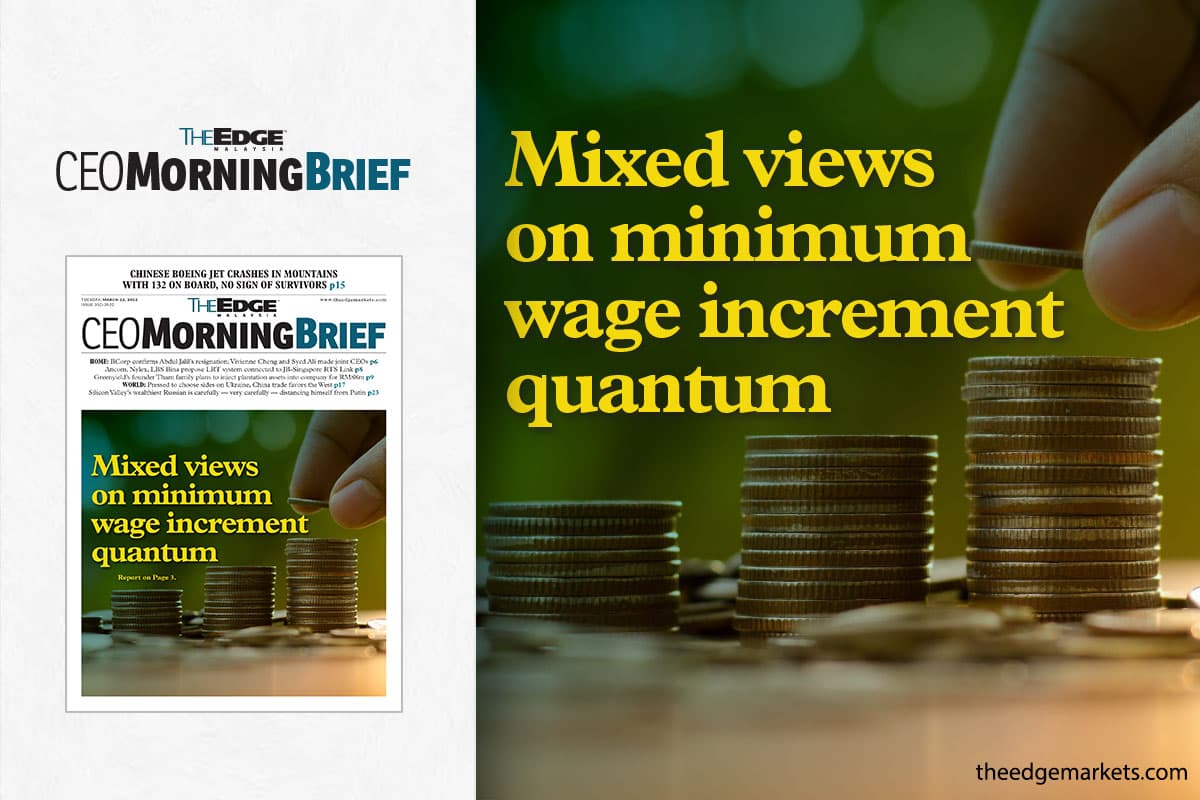
KUALA LUMPUR (March 22): Economists are divided over the quantum of the minimum wage hike at a time when businesses are still grappling with the impact from Covid-19, which has been raging for two years.
Last Saturday, Prime Minister Datuk Seri Ismail Sabri Yaakob announced that the minimum wage will be increased to RM1,500 from RM1,200 effective May 1. Initially, it will apply to big firms and government-linked companies.
Socio-Economic Research Centre (SERC) executive director Lee Heng Guie said a jump of 25% in minimum wage is too much for businesses to absorb as they are not fully recovered from the coronavirus pandemic.
“The government is increasing the labour costs at a time where other costs are also increasing. Businesses have continued to face the aftermath of the pandemic, business economic shocks, rising business costs amid the supply chain disruptions and the shortage of workers. All these have been worsened by the Russia-Ukraine war which has pushed up material prices,” he told The Edge.
Sunway University Business School professor of economics Dr Yeah Kim Leng opined that a staggered increase over two years could be more appropriate to avoid derailing the recovery while a sudden steep hike could fuel a wage-price inflation spiral in the economy.
“A more gradual but committed schedule of minimum wage increase will also allow businesses to better plan ahead”.
He explained that the current economic conditions are less conducive for a drastic hike as the economy is still at the early stage of recovery from the pandemic, coupled with a new global shock emanating from the Ukraine war.
However, UOB Malaysia senior economist Julia Goh thinks that the latest adjustment quantum is not too much, given that the last adjustment to minimum wage was in early 2020, which was two years ago.
It was increased by RM100 to RM1,200 per month for 56 major cities. For non-urban areas and rural towns, the minimum wage is currently RM1,100 per month.
Citing that the adjustment of minimum wage is a measure against higher cost of living, Goh said the wage rise should also be commensurate with an increase in productivity.
“It is understandable that businesses are concerned about the impact on their bottom lines with the new minimum wage set at RM1,500 per month. While a 25% increase appears high, the nominal level does not seem that high when we think about how much the cost of living has increased. Also to be taken into consideration is that the median per capita household income fell 10% to RM1,537 in 2020,” she said.
In addition, she stressed that raising the minimum wage will help retain and attract foreign labour as the economy reopens.
Higher inflation likely as costs are passed on to consumers
An increase in the minimum wages will inevitably exert pressures on businesses production, costs and margins. As most businesses are likely to pass on the additional business costs, Lee said, consumers will feel the pinch, causing the worsening of inflation.
The Consumer Price Index expanded at a slower rate of 2.3% in January 2022 compared with the same month a year ago.
Yeah is of the view that the impact from the wage hike — be it net positive or net negative in the short and long term — depends on the sustainability of businesses, which in turn relies on productivity and profitability.
“The current concern is that a sharp increase in the minimum wage may result in business closures and retrenchments. Both employers and employees and, therefore, the economy is worse off.
“The other possible effect is that inflation may rise to offset the increase in purchasing power of the employees. It will be back to square one with the poor households suffering more from inflation,” said Yeah.
He added that the key uncertainty is the ability of businesses, especially the small and medium-sized enterprises (SMEs), to cope with the wage hike.
On the bright side, Goh sees the wage hike acting as an incentive for larger businesses to adopt more automation and value-added processing. This is despite the significant impact on various businesses, especially the tourism-related sectors.
Sectors affected by wage hike
Meanwhile, CGS-CIMB Research pointed out that sectors that are likely to be affected by the 25% increase in minimum wage are plantation, manufacturing (gloves and others), construction and services (travel, food and beverages, hotel, retail and others).
Its analysts Ng Lee Fang and Nagulan Ravi said in a note the higher minimum wage will lead to increased cost of goods and services for companies, which are likely to partially pass this on to consumers in the second half of 2022.
“However, for companies who are not able to pass on the costs due to weak demand, profit margins and earnings could tumble,” they said.
That said, the higher minimum wage will boost the purchasing power of the low income group and help them cope with the rising costs of living, which is slightly positive for the consumer sector.
The mid-level minimum wages in Indonesia, the Philippines, Thailand and Vietnam range from US$157 (RM660.17) to US$270 per month.